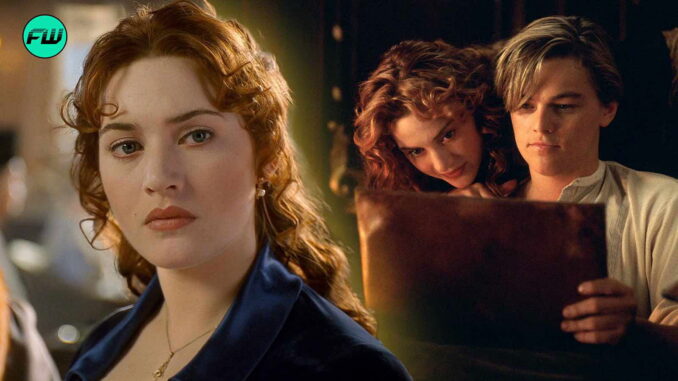
The enduring myth of Kate Winslet and Leonardo DiCaprio, forever intertwined by the ill-fated romance of Jack and Rose, persists as one of cinema’s most beloved off-screen narratives. For decades, fans have projected their desires onto the real-life actors, imagining a love as epic and tragic as the one they shared aboard the Titanic. Yet, Winslet has consistently, playfully, and firmly debunked the fantasy: she never "fancied" Leonardo DiCaprio. He was, and remains, her closest friend, her "RoMate."
It is precisely this disavowal of romantic attraction that makes her subsequent confession so profoundly illustrative: after certain deeply intimate scenes, even without fancying him, she still felt a powerful, almost primal "wanting him" after the director called "cut." And then, she said, "He gets up and walks off."
This stark dichotomy – no real-life romantic inclination, yet a visceral yearning in the aftermath of a scene – illuminates the very heart of the actor’s craft, the permeable membrane between performance and reality, and the sudden, sometimes disorienting, rupture when that fragile illusion is shattered.
Consider the hothouse of emotion that is a film set, particularly one as grand and ambitious as Titanic. Within its carefully constructed reality, two actors are tasked with embodying a love story so intense, so immediate, that it must transcend the screen and pierce the audience’s very soul. This isn’t achieved by mere recitation of lines; it demands an almost alchemical fusion of self and character. Winslet, as Rose, and DiCaprio, as Jack, had to fully inhabit the skins of young lovers experiencing the intoxicating rush of first love, forbidden passion, and the terrifying shadow of impending doom.
For Winslet, in those moments of profound intimacy – whether it was the raw vulnerability of the drawing scene, the desperate embraces in the sinking ship, or the whispered promises – she was not simply playing Rose. She was Rose. Her heart, her breath, her very being was subsumed by the character’s desires, her fears, her blossoming love for Jack. In that hyper-realized space, amidst the orchestrated chaos of a film set, the boundaries between Kate the person and Rose the character thinned to invisibility. The yearning, the tenderness, the fierce protectiveness of Rose for Jack became Kate’s own, a feeling so potent it bled beyond the confines of the script. It was a desire not of Kate for Leo, but of Rose for Jack, resonating with such force within Kate that it became almost indistinguishable from her own immediate experience.
Then comes the brutal punctuation: "CUT!"
The spell, painstakingly woven, shatters. The lights come up, the crew shifts, the illusion evaporates in a puff of smoke. And then, the ultimate act of severance: "He gets up and walks off." It is the sudden, almost violent, unplugging from a world of intense connection. It’s the abrupt end of a dream that felt more real than waking life. The "wanting him" isn't romantic longing for the actor, but the profound, lingering echo of a character’s yearning, suddenly deprived of its object. It’s the phantom limb of an embrace that, moments before, felt utterly real. It’s the residual adrenaline, the residue of intimacy, the visceral memory of a bond that was, for a fleeting time, everything.
For Winslet, the professional actor, the transition back to herself must be immediate. The set cannot wait for emotional decompression. DiCaprio, equally professional, understands the need to break character, to separate himself from the intensity, to prepare for the next take or simply to return to the reality of the day. His "walking off" is not a personal slight, but a necessary act of detachment, a return to the pragmatic business of filmmaking.
But for the part of Winslet that was still Rose, the jolt must have been immense. It’s akin to waking from a vivid, heart-wrenching dream and feeling the lingering pang of loss, even though the dream never truly existed. It speaks to the incredible empathic capacity of actors, their ability to dive so deeply into a role that the emotions of their characters become, for a time, their own. And when that conduit is abruptly severed, when the character’s world dissolves, the emotional residue can be disorienting, leaving a void that manifests as a "wanting" – not for a person, but for the continuation of a profound, created experience.
Winslet’s candid insight offers a rare glimpse behind the curtain, demystifying the on-screen chemistry while simultaneously elevating the art of acting. It reminds us that performance is not merely mimicry but a profound act of empathy and temporary embodiment. The "wanting him" after "he gets up and walks off" is a testament to the power of storytelling, the transient yet indelible connections forged in the crucible of creation, and the bittersweet moment when the magic, by necessity, must yield to the mundane. It is the heart of Rose, still beating with love for Jack, momentarily caught in the body of Kate, who must then, professionally and gracefully, let him go.